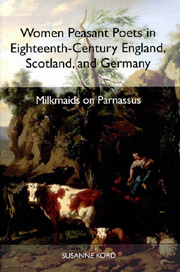Book contents
- Frontmatter
- Contents
- List of Illustrations
- Acknowledgments
- Introduction: Aesthetic Evasions and Social Consequences
- 1 Back to Nature: Bourgeois Aesthetic Theory and Lower-Class Poetic Practice
- 2 The Wild and the Civilized: Poet Making
- 3 The Life As the Work: Counterfeit Confessions, Bogus Biographies, Literary Lives
- 4 A Literature of Labor: Poetic Images of Country Life
- 5 Inspired by Nature, Inspired by Love: Two Poets on Poetic Inspiration
- 6 Of Patrons and Critics: Reading the Bourgeois Reader
- Conclusion: On the Gender and Class of Art
- Appendix: Short Biographies of Women Peasant Poets
- Works Cited
- Index
6 - Of Patrons and Critics: Reading the Bourgeois Reader
Published online by Cambridge University Press: 05 February 2013
- Frontmatter
- Contents
- List of Illustrations
- Acknowledgments
- Introduction: Aesthetic Evasions and Social Consequences
- 1 Back to Nature: Bourgeois Aesthetic Theory and Lower-Class Poetic Practice
- 2 The Wild and the Civilized: Poet Making
- 3 The Life As the Work: Counterfeit Confessions, Bogus Biographies, Literary Lives
- 4 A Literature of Labor: Poetic Images of Country Life
- 5 Inspired by Nature, Inspired by Love: Two Poets on Poetic Inspiration
- 6 Of Patrons and Critics: Reading the Bourgeois Reader
- Conclusion: On the Gender and Class of Art
- Appendix: Short Biographies of Women Peasant Poets
- Works Cited
- Index
Summary
Reading the Reader: Of Critics and Posterity
Virtually every woman peasant poet's work contains several pieces in which the poet annotates, preempts, ventriloquizes, satirizes, or otherwise comments on her own projected reception in bourgeois and aristocratic circles. The critic, in particular, is accorded a major role in these poems. In nearly all works in which the professional critic appears, he assumes a spiteful and destructive personality: even in cases where reader response is depicted as positive, as it is in poetry by both Anna Louisa Karsch and Christian Milne, the critical response to their work is portrayed as inevitably devastating. Hardly has the “rustic damsel issue[d] forth her lays,” in the hopes of gaining admission to the lower slopes of Parnassus, when the critic appears to dash her aspirations: “‘Vain are her hopes,’ the snarling critic cries; / ‘Rude and imperfect is her rural song.’” Janet Little, in this and other poems, endows her critic with two qualities designed to secure the reader's sympathies for the author rather than the critic: one is the presentation of the critic's response not as literary criticism but as class prejudice, for his objections are largely based on the author's class background, on the fact that she is a “rural” writer who cannot lay claim to the polish and sophistication of the bourgeois author. Little's poem hints at her awareness of the paradoxical relationship between the emerging consciousness of art as bourgeois Art, which is already prefigured in the critic's response, and the bourgeois Nature aesthetic which, conversely, demands rusticity and simplicity from the rural author's work.
- Type
- Chapter
- Information
- Women Peasant Poets in Eighteenth-Century England, Scotland, and GermanyMilkmaids on Parnassus, pp. 216 - 239Publisher: Boydell & BrewerPrint publication year: 2003



